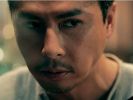Eye For Film >> Movies >> Dragon (2011) Film Review
There is a peaceful village, a gentle place with the rhythms and rituals of everyday life - there are families, and there is breakfast, and there is the paper mill. Liu Jinxi works there, a family man, a gentle soul, but there's an obvious clue that all is not as it seems - Liu is played by "Hong Kong superstar" and fight choreographer Donnie Yen.
So there is a fight - bandits rob a shop, but in a well constructed and messy battle Liu is able to defeat the pair through a combination of luck and happenstance. Or so it seems, Liu feted as a hero by his adopted village, but one man has doubts. That man is Detective Xu, a bespectacled expert in the physiology of Qi. A traumatic incident in his own past forces him to manipulate the energies in his own body: a needle in one point to control the poison in his veins, another to suppress his emotion - he is a sort of acupunctuarial Robocop.

There's a touch of Sherlock about him too, however - it's his close investigation of the bodies that reveals one is among the top ten wanted men in the province - casting doubt on Liu's protestations that he is just a humble paper-maker. Within a dazzling reconstruction (to mix media massively, call it Sherlock Holmes' Kung Fu CSI Rashomon) of the original fight he wanders about and between and through the action - a suspiciously broken jar here, a scuffed floorboard there, a later suspicion that Liu might not weigh as much as a man (though perhaps more than a duck) and the conclusion is clear - Liu is a master of Qi, a stone-cold hardened killer, perhaps even one of the 72 Daemons. Yet when Xu wishes to put his theory to the test things go awry.
It's a little odd to encounter studied meditations on the nature of fate, on the fates of our own natures, on what it means to come from a 'family of butchers'. Xu starts to seem more disassociatively disturbed than diagnostically devious as his hypothesis is stretched by circumstance. His belief in the law is tested, his belief in justice is tested, and through it all, smiling beatifically, is the seeming simple Liu.
There are other fights though - just because it becomes clear that Xu is probably wrong about Liu doesn't mean there aren't going to be other battles. Rooftop chases, dizzying knife-fights punctuated by stampeding cattle, people getting punched through things, people punching through things, swirls of Qi and some of these not just in Xu's imagination. Throw in graphic representations of the heart-stopping powers of Wu Xia, all clotted arteries and shaken brains and the stylistic melange is complete.
It's set in 1917. Steam packets and telegraphs and gunboat diplomacy are all over the horizon - the future is here in Detective Xu, but his modernist interpretation of old legends is reflective of the film. That dichotomy does leave the film feeling a bit muddled in places, but it always manages to scrabble its way back. There are some really nice touches - when Liu gently replaces his still-sleeping wife's hand on his sleeve with a curl of blanket, the banter of the breakfast table, the switches from Xu's world where Qi is real and can be measured and observed to Liu's where what matters is properly scraping the wood before applying the paper. The clash of world-views is made even more pronounced when Tang Long, scion of the 72 Daemons appears.
There's a Western influence - in the 'hanging up the gun' sense, and it's noirish in places too. Detective Xu's belief in the law isn't reflected by the officers around him, and his dedication to it appears to have cost him a lot. This is dark, and sweet, and repeatedly inventive, but doesn't always feel coherent. The fights, when they occur, are splendid, and the conversations, when they occur, are good, but there seems to be some difficulty in bringing together the worlds that Detective Xu sees and Liu wants, and what is actually happening.
Peter Chan directs, and his Warlords featured a host of talents with similar meditations on the responsibilities of the martially skilled. Oi Wah Lam's script feels a little muddled but the film's ambition makes that forgiveable. Technically it's accomplished, with some stand out locations - Liu's family home, with its nooks and crannies and courtyard and grass roof has a touch of Chekov's gun to it - if we see a fireplace in the first act someone is going to be kicked through it by the third.
Any martial arts film released this year is going to find itself compared to The Raid - so, where it has a brutal economy and sustained tone, let us be clear that Dragon is doing something different - in reconstructing wu xia it is perhaps tonally closer to A History of Violence but one wonders if it could have been made more like Unforgiven. For all that, it can be unhelpful to talk about films through the lenses of others, so let us be clear - Dragon is smart, studied, stunning in places, but suffers a little from it - where one hopes that it would be instinctive and natural it seems a little hesitant, and as a result punches below its weight.
Reviewed on: 22 Jun 2012




















